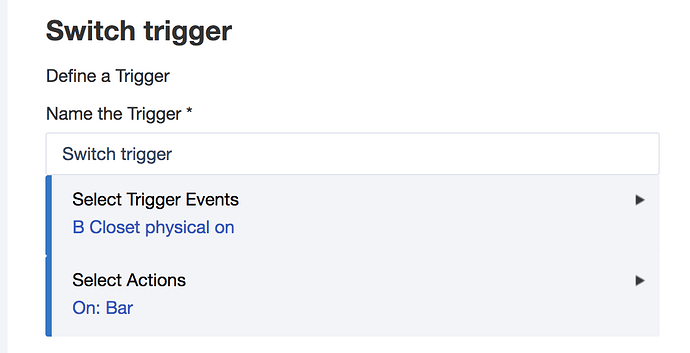if anyone wants to help
/**
/
/*
-
Enerwave Dual Load ZWN-RSM2
*/
// for the UI
metadata {
definition (name: “Enerwave Dual Load ZWN-RSM2”, author: “matt”) {
capability "Switch"
capability "Polling"
capability "Configuration"
capability “Refresh”
attribute "switch1", "string"
attribute "switch2", "string"
command "on1"
command "off1"
command "on2"
command "off2"
}
simulator {
// TODO: define status and reply messages here
}
tiles {
standardTile("switch1", "device.switch1",canChangeIcon: true) {
state "on", label: "switch1", action: "off1", icon: "st.switches.switch.on", backgroundColor: "#79b821"
state "off", label: "switch1", action: "on1", icon: "st.switches.switch.off", backgroundColor: "#ffffff"
}
standardTile("switch2", "device.switch2",canChangeIcon: true) {
state "on", label: "switch2", action: "off2", icon: "st.switches.switch.on", backgroundColor: "#79b821"
state "off", label: "switch2", action: "on2", icon: "st.switches.switch.off", backgroundColor: "#ffffff"
}
standardTile("refresh", "device.switch1", inactiveLabel: false, decoration: "flat") {
state "default", label:"", action:"refresh.refresh", icon:"st.secondary.refresh"
}
standardTile("configure", "device.switch1", inactiveLabel: false, decoration: "flat") {
state "default", label:"", action:"configure", icon:"st.secondary.configure"
}
main(["switch1", "switch2"])
details(["switch1","switch2","refresh","configure"])
}
}
// 0x25 0x32 0x27 0x70 0x85 0x72 0x86 0x60 0xEF 0x82
// 0x25: switch binary
// 0x32: meter
// 0x27: switch all
// 0x70: configuration
// 0x85: association
// 0x86: version
// 0x60: multi-channel
// 0xEF: mark
// 0x82: hail
// parse events into attributes
def parse(String description) {
log.debug “Parsing desc => ‘${description}’”
def result = null
def cmd = zwave.parse(description, [0x60:3, 0x25:1, 0x70:1, 0x72:1])
if (cmd) {
result = createEvent(zwaveEvent(cmd))
}
return result
}
//Reports
def zwaveEvent(physicalgraph.zwave.Command cmd) {
createEvent(descriptionText: “${device.displayName}: ${cmd}”)
}
def zwaveEvent(physicalgraph.zwave.commands.basicv1.BasicReport cmd) {
log.debug "BasicReport $cmd.value"
def map = [name: “switch1”, type: “physical”]
if (cmd.value == 0) {
map.value = “off”
}
else if (cmd.value == 255) {
map.value = “on”
}
//refresh()
return map
}
def zwaveEvent(physicalgraph.zwave.commands.switchbinaryv1.SwitchBinaryReport cmd) {
//[name: “switch”, value: cmd.value ? “on” : “off”, type: “digital”]
log.debug “SwitchBinaryReport $cmd.value”
}
def zwaveEvent(physicalgraph.zwave.commands.multichannelv3.MultiChannelCmdEncap cmd) {
//log.debug “MultiChannelCmdEncap $cmd”
def map = [ name: "switch$cmd.sourceEndPoint" ]
if (cmd.commandClass == 37){
if (cmd.parameter == [0]) {
map.value = "off"
}
if (cmd.parameter == [255]) {
map.value = "on"
}
log.debug "Processed zwave message: $map"
map
}
}
// handle commands
def refresh() {
delayBetween([
log.debug(“refreshing s1”),
zwave.multiChannelV3.multiChannelCmdEncap(sourceEndPoint:1, destinationEndPoint:1, commandClass:37, command:2).format(),
log.debug(“refreshing s2”),
zwave.multiChannelV3.multiChannelCmdEncap(sourceEndPoint:2, destinationEndPoint:2, commandClass:37, command:2).format(),
//zwave.multiChannelV3.multiChannelCmdEncap(sourceEndPoint:1, destinationEndPoint:2, commandClass:37, command:2).format()
])
}
def poll() {
delayBetween([
zwave.manufacturerSpecificV1.manufacturerSpecificGet().format()
])
}
def configure() {
log.debug "Executing ‘configure’"
delayBetween([
zwave.configurationV1.configurationSet(parameterNumber:4, configurationValue: [0]).format() // Report reguarly
])
}
def on1() {
delayBetween([
zwave.multiChannelV3.multiChannelCmdEncap(sourceEndPoint:1, destinationEndPoint:1, commandClass:37, command:1, parameter:[255]).format(),
zwave.multiChannelV3.multiChannelCmdEncap(sourceEndPoint:1, destinationEndPoint:1, commandClass:37, command:2).format(),
zwave.multiChannelV3.multiChannelCmdEncap(sourceEndPoint:2, destinationEndPoint:2, commandClass:37, command:2).format(),
])
}
def off1() {
delayBetween([
zwave.multiChannelV3.multiChannelCmdEncap(sourceEndPoint:1, destinationEndPoint:1, commandClass:37, command:1, parameter:[0]).format(),
zwave.multiChannelV3.multiChannelCmdEncap(sourceEndPoint:1, destinationEndPoint:1, commandClass:37, command:2).format(),
zwave.multiChannelV3.multiChannelCmdEncap(sourceEndPoint:2, destinationEndPoint:2, commandClass:37, command:2).format(),
])
}
def on2() {
delayBetween([
zwave.multiChannelV3.multiChannelCmdEncap(sourceEndPoint:2, destinationEndPoint:2, commandClass:37, command:1, parameter:[255]).format(),
zwave.multiChannelV3.multiChannelCmdEncap(sourceEndPoint:1, destinationEndPoint:1, commandClass:37, command:2).format(),
zwave.multiChannelV3.multiChannelCmdEncap(sourceEndPoint:2, destinationEndPoint:2, commandClass:37, command:2).format(),
])
}
def off2() {
delayBetween([
zwave.multiChannelV3.multiChannelCmdEncap(sourceEndPoint:2, destinationEndPoint:2, commandClass:37, command:1, parameter:[0]).format(),
zwave.multiChannelV3.multiChannelCmdEncap(sourceEndPoint:1, destinationEndPoint:1, commandClass:37, command:2).format(),
zwave.multiChannelV3.multiChannelCmdEncap(sourceEndPoint:2, destinationEndPoint:2, commandClass:37, command:2).format(),
])
}


